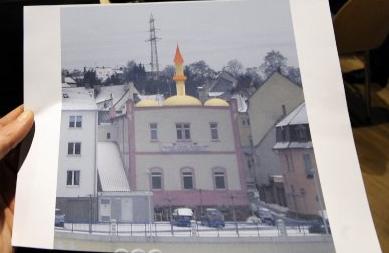 A small Muslim community in a western German town would like to build a minaret on its mosque. But the plan has triggered passionate opposition from locals, many of whom rely on rhetoric from the extreme right in railing against the “symbol of Islam’s quest for power.”
A small Muslim community in a western German town would like to build a minaret on its mosque. But the plan has triggered passionate opposition from locals, many of whom rely on rhetoric from the extreme right in railing against the “symbol of Islam’s quest for power.”
“Willkommen,” reads the stencilled print on the wall along the riverside boardwalk in the small town of Völklingen. Not content to just welcome its German guests, however, the message is translated into a number of languages. “Bienvenue … bienvenidos … velkommen,” it reads. And “hosgeldiniz,” a nod to the city’s substantial Turkish population.
Elsewhere in the city – particularly in the quarter known as Wehrden – Muslim immigrants may not feel quite as welcome. A small mosque on the banks of the Saar River there has applied for a permit to build a small minaret on its roof – triggering a wave of at-times vehement protest reminiscent of the fuss surrounding theNovember 2009 referendum in Switzerland to ban minarets in the country.
“I am against the Islamification of our fatherland!” reads a message, posted by “Tommy” on the Web site of the local paper Saarbrücker Zeitung. “Islam is the greatest threat facing humanity,” he adds.
The debate in Völklingen is once again showing how quickly right-wing rhetoric can cross over into the mainstream when it comes to debates on Islam in Europe. Local right-wing extremists – two of whom are in the Völklingen city council – have argued that minarets are “symbols of Turkish dominance.”
The local news paper has used the exact same rhetoric on its editorial pages. “This minaret should not be built,” the Saarbrücker Zeitung wrote in late January. “It symbolizes Islam’s quest for power and is nothing less than a provocation. In the course of the Muslim conquests, minarets were first used as watch towers and only subsequently as religious symbols. Following the violent seizure of new territories, minarets were built as manifestations of Muslim rule.”
Minaret opponents are now looking into the possibility of holding a referendum on the issue in Völklingen.
